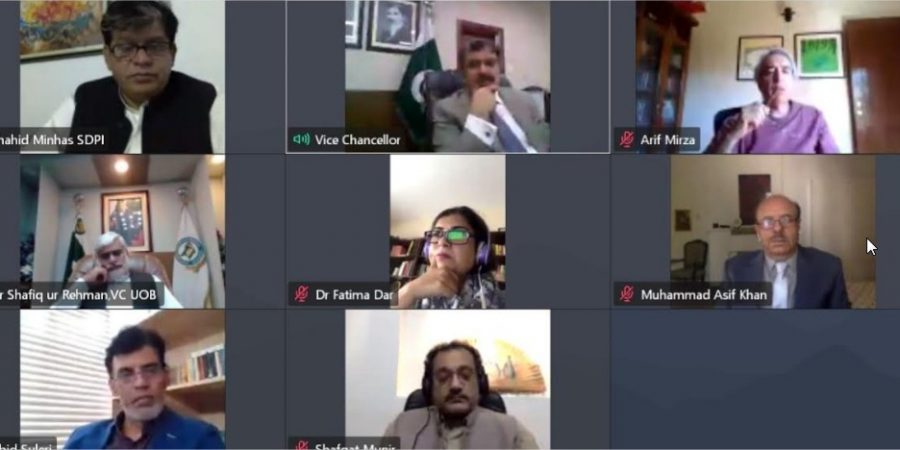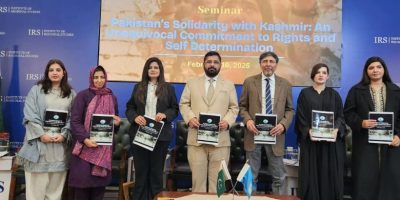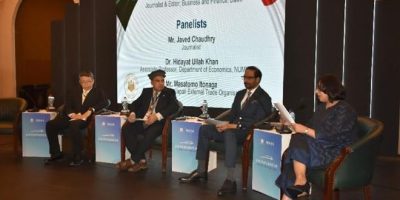Academia underpin need of broader policy dialogue on education in post-Covid19 scenario

ISLAMABAD, MAY 15 / DNA / = The senior academia and educationists across Pakistan have termed Covid19 as an opportunity to align the entire higher education in the country with the future socio-economic realities. The situation resulted by the global pandemic therefore demands a total paradigm shift; and a broader academic policy dialogue is the need of hour to ensure the quality and future-oriented education.
They shared these views with the audience at online ‘Post Covid-19 Scenario – Challenges and Options for Higher Education Institutions’ organized by the Sustainable Development Policy Institute (SDPI), in coordination with Higher Education Commission (HEC) and Allama Iqbal Open University (AIOU) here on Friday.
Dr Nadia Tahir, Managing Director, Quality Assurance Agency (QAA), Higher Education Commission (HEC) Pakistan, said that the universities across Pakistan have been tasked to develop SoPs and Learning Management Systems (LMS) to ensure quality online learning to students. She said that the universities would now have to set the targets for the progress as Covid19 has changed the entire landscape of the education.
She says HEC and the universities have to work together to achieve the shared goals and its quite heartening to know that the universities across Pakistan are accepting the challenge to avoid disruption in the learning. The conventional teaching system now needs to be replaced with ‘equip and empower students’ approach.
Dr Abid Qaiyum Suleri, Executive Director SDPI, said as predicted by the UN, we would have to live with the pandemic from now onwards for quite a longer period or permanently. He called for the need to grab opportunities out of the Covid 19 challenges by applying a proactive approach.
“Eliminating digital-divide must be ensured while introducing online learning as we cannot afford to leave anyone behind,” Dr Suleri said. He said that HEC would have to ensure that the new learning provided by the universities is compatible with rapidly changing job market.
To respond to critical need of bridging research-policy gap, he ensured the participants that SDPI would be there to provide all out support and facilitation in this regard. Forming Education Advisory Council would be one of the suggestions for the government to respond to emerging challenges in the field of education, he concluded.
Dr Zia Ul-Qayyum, Vice Chancellor Allama Iqbal Open University (AIOU) was of view that the technological solutions should be utilized to create an enabling environment for the education amidst the crises posed by the pandemic. He said that a policy dialogue on the academic issues must be initiated to explore the opportunities to meet the unprecedented challenges.
“SDPI being a vibrant think tank and research institute may take the lead and facilitate such s dialogue forum,” he suggested and added that open distance learning policy also needs to be introduced to provide necessary guidelines.
Dr Shafiq-ur-Rehman, Vice Chancellor, University of Balochistan, on the occasion highlighted the issue of lack of connectivity faced by the students in remote areas. Dr M Asif Khan, Vice Chancellor, University of Peshawar, shared the same concerned and said that while the universities are taking all the possible measures to be adaptive to new environment, we must ensure that no student is left out from the learning process due to lack of access.
Dr Fatima Dar, Director Iqra University said with breaking of the pandemic, the universities in public and private sectors are confronting with similar kinds of challenges. She said the broader cooperation among the universities would be important to share learning and experience mutually.
Related News

IRS report records approx. 700 raids and over 4,000 detentions in IIOJK in 2025
ISLAMABAD, FEB 10: /DNA/ – The Institute of Regional Studies (IRS), Islamabad, launched its AnnualRead More

Japan, Pakistan hold business seminar to strengthen future economic ties
ISLAMABAD, FEB 10 /DNA/ – Akamatsu Shuichi, Ambassador Extraordinary and Plenipotentiary of Japan to Pakistan,Read More


Comments are Closed